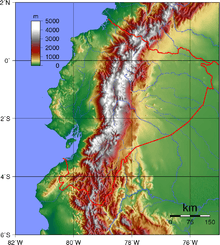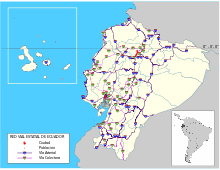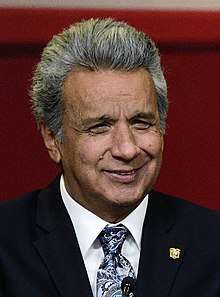Ecuador officially the Republic of Ecuador (Spanish: República del Ecuador, which literally translates as "Republic of the Equator"; Quechua: Ikwadur Ripuwlika), is a country in northwestern South America, bordered by Colombia on the north, Peru on the east and south, and the Pacific Ocean on the west. Ecuador also includes the Galápagos Islands in the Pacific, about 1,000 kilometres (620 mi) west of the mainland. The capital city is Quito, which is also the largest city. The sovereign state of Ecuador is a middle-income representative democratic republic with a developing economy that is highly dependent on commodities, namely petroleum and agricultural products.

Flag of Ecuador

Ecuador Topography

The Road Network of Ecuador

Lenin Moreno, the 47th President of Ecuador
Quotes
- When Rafael Correa first ran for Ecuador’s presidency in 2006, supporters at his rallies brandished belts in homage to their candidate, whose surname means “belt” or “strap”. “Dale correa,” or “give them a whipping,” the crowds roared. It was a demand to punish what they regarded as the corrupt elites who had governed Ecuador since the return of democracy in 1979. Mr Correa promised he would. He won that election and then two more. His presidency brought a rare spell of political stability. Living standards rose and public services improved. Mr Correa, who has a respectable approval rating of 42%, is not a candidate. He is counting on Lenin Moreno, a former vice-president, and his running mate, Jorge Glas, the current vice-president, to carry on his “citizens’ revolution”. Mr Moreno, who shares his alarming first name with 18,000 other Ecuadoreans, hopes to win in the first round by capturing the bulk of Mr Correa’s support and adding to it.
- What to expect from Ecuador’s elections. The Economist, (18 February 2017)
- Ecuador, still a relatively poor Third World country, has made achievements we can still only dream of here: free health care, free university education, effective anti-poverty programs, democratizing the media, environmental protection, respect for the rights of oppressed groups such as LBGTs and Original Peoples, repudiation of debt gouging by the banks, increasing taxes on the rich, clean elections. It has taken the initiative, along with President Evo Morales of Bolivia, in demanding action by the West in combating climate change and in shutting down tax havens. The challenges facing Ecuador remain the continued power of the old neoliberal ruling elite in the country, the need to further diversify the economy, to eliminate poverty, and the need to build an organized, politically active mass structure to carry on the Citizens Revolution.
The accomplishments of the Citizens Revolution have made President Correa one of the most popular presidents in Latin America. Moreover, in a poll of 18 Latin American countries, Ecuador ranked the highest in citizens’ evaluation of their country’s government, in reduction of corruption, and distribution of wealth. Yet, “The greatest achievement of this revolution is having recovered pride and hope. We recovered our country,” said Correa speaking on the 10th anniversary of the revolution.
- Ecuador’s transformation during the presidency of Rafael Correa (2007-2017) and The Citizens Revolution stands as great step forward for the worldwide struggle against the 1%. President Correa... came to power in a country controlled by a super-rich elite, dependent on oil and commodities exports. Ecuador still suffered from the devastating effects of corrupt banker dealings, which caused the currency and peoples’ savings to lose two-thirds of their value, leading to the US dollar becoming the new national currency. Governments preceding Correa instituted neoliberal austerity and privatization programs, causing inequality, poverty and unemployment to soar. Ecuador became one of the poorest and least developed nations in the region. Poverty rates reached 56% of the population, and from 1998-2003 close to 2 million Ecuadorans out of a population of 12-13 million, over 1 in 10, had left the country for economic reasons.
William Blum, in Killing Hope, wrote that the CIA in Ecuador “infiltrated, often at the highest levels, almost all political organizations of significance, from the far left to the far right... In virtually every department of the Ecuadorian government could be found men occupying positions high and low who collaborated with the CIA for money. At one point, the agency could count among this number the men who were second and third in power in the country.” Ecuador was also saddled with the US’s largest air base in the region at Manta, instrumental in Plan Colombia and in enforcing international banking and corporate rule over Ecuador.
- Lenín Moreno actually pledged during his election campaign several months ago was to continue the "Citizens Revolution" of Rafael Correa, whose left-wing government Moreno was part of for 10 years. Moreno called Correa the greatest president Ecuador ever had during the campaign. And here is a video of Moreno leading a crowd in cheers of “Rafael! Rafael!” at a campaign rally.
Moreno is now, through a referendum that he never proposed on the campaign trail—it was actually proposed by his right-wing opponent—asking voters to (retroactively) re-impose term limits, handpick a body with “transitional” powers to fire 150 authorities (judges, prosecutors, regulators etc.…) and drastically reduce taxes on wealthy land-speculators. Moreno did not campaign for any of those things.
He is now also talking about a “free trade” deal with the United States—another policy he would never have dared to propose while he needed Correa’s support to get elected. Further, Moreno has given Ecuador’s private banks exclusive control over electronic money—which he never would have proposed while he needed Correa. In 1999, the private banks, after years of corruption and deregulation, totally crashed Ecuador’s economy. Reining them in, including their media power, was key to the economic success Ecuador had under Correa.- Western Media Hail Ecuador’s Cynical President Moreno, FAIR,by Joe Emergsberger, (4 February 2018)
- How can Moreno get away (so far) with his post-election about face? By quickly turning on Correa, he immediately won over Ecuador’s big private media, and quickly made changes to public media so that it provided negligible opposition to his right turn. For example, Moreno promptly put a former editor of the right-wing newspaper El Comercio in charge of the government-run El Telegrafo. The results were obvious during a January 21 TV interview broadcast across the country, in which journalists from two right-wing networks and a third from public media interviewed Moreno.
- Western Media Hail Ecuador’s Cynical President Moreno, FAIR by Joe Emergsberger, (4 February 2018)
- The first irregularity [in the prosecution of Rafael Correa] is that, according to our constitution, authorization to prosecute the ex-president should have been received from the National Assembly. In fact, it was requested by Judge Camacho... Second... one must understand why the prosecution of the former president had to be authorized by the National Assembly.... events to which he is being linked happened while he was president. The law says that for prosecution to proceed presidential immunity must first be removed for events that took place while he was in office... A third irregularity... The acting prosecutor has not been sworn in before the National Assembly as mandated by the constitution. Their authority is completely illegitimate. A fourth irregularity is that the arguments used to link Rafael Correa to the Balda’s case [the attempted kidnapping] are utterly weak and confirm that there is a political vendetta being pursued against the former president.
- The Persecution of Rafael Correa, CounterPunch, by Joe Emergsberger, (9 July 2018)
- Ecuador’s top court ordered former President Rafael Correa on Wednesday to stand trial for his alleged role in the 2012 botched kidnapping of an opposition lawmaker. Correa was charged in September by prosecutors of orchestrating Fernando Balda’s kidnapping in Bogota after he fled to Colombia’s capital to escape what he considered persecution by Correa. A supreme court justice decided that the accusations against Correa, his top intelligence chief and two others merited a trial. Judge Daniel Camacho also formally declared Correa a fugitive after he flouted for months an order to appear before the court every 15 days as part of the ongoing probe. For his defiance, Ecuadorean authorities had previously requested Correa’s arrest and extradition from Belgium, where he has been living since leaving office last year.
- Ecuador President Ordered to Stand Trial in Abduction, Voice of America (7 November 2018)
- Ecuador has signed a $4.2bn programme with the IMF, signalling a final break by President Lenín Moreno with the policies of his leftist predecessor in a deal that he said saved the country from becoming like Venezuela. The loan to the Opec country forms part of a larger $10bn package with other multilateral lenders... Mr Moreno, who came to power in 2017, has sought to curb public spending and buttress Ecuador’s external accounts with bond issues...
“Thanks to the firm decisions I have made, we are not what Venezuela is today . . . we have recovered democracy,” Mr Moreno said... “This money will create work opportunities for those who have not found something stable.” The IMF deal comes on the seventh anniversary of Mr Assange’s asylum at the embassy... “Ecuador's willingness to call the IMF certainly proves that the government is serious about stabilising the country's finances and embracing economic reforms,” said Siobhan Morden, head of Latin American fixed income strategy at Nomura... Investors praised Mr Moreno’s decision to get ahead of Ecuador’s economic problems by turning to multilateral lenders now... Ecuador’s extended fund facility with the IMF, which must still be approved by the Washington-based lender’s board, will support the government’s plans to create a “more dynamic, sustainable and inclusive economy,” said Anna Ivanova, the IMF mission chief to Ecuador.- IMF agrees to $4.2bn fund for Ecuador, The Financial Times ( 21 February 2019)
- Hours after Julian Assange was ousted from his diplomatic refuge at the Ecuadorian Embassy in London, the country released a laundry list of alleged transgressions which brought the WikiLeaks founder's seven-year residency to an end... But while Ecuador had undoubtedly tired of its London house guest, the motivations for stripping Assange of his asylum and allowing in officers of the Metropolitan Police are likely to have been more complex... On March 25, WikiLeaks posted a tweet bringing attention to a corruption probe that Ecuadorian President Lenin Moreno is facing. It linked to an anonymously registered website hosting a vast trove of leaked emails, text messages and other documents pertaining to Moreno's private life. The Ecuadorian government blamed WikiLeaks for the leaked documents, dubbed the INA Papers, an allegation that WikiLeaks denies.
- Why did Ecuador give up Assange after seven years? by Lauren Said-Moorhouse, at CNN] (13 April 2019)
External links
This article is issued from
Wikiquote.
The text is licensed under Creative
Commons - Attribution - Sharealike.
Additional terms may apply for the media files.